It’s Friday, September 21st, 2012….and a very Happy Birthday goes out to our older brother Rob….along with many happy returns!
Now, here’s The Gouge!
First up, courtesy of The Washington Examiner‘s Mark Tapscott, submitted for your perusal….
The Obama you don’t know

On the other hand, many of us knew him at first glance!
“….Beyond the spin and the polls, a starkly different picture emerges. It is a portrait of a man quite unlike his image, not a visionary reformer but rather a classic Chicago machine pol who thrives on rewarding himself and his friends with the spoils of public office, and who uses his position to punish his enemies.”
http://washingtonexaminer.com/introduction-the-obama-you-dont-know/article/2508080#.UFuzyxh9nUM
Coupled with this next item, forwarded by Balls Cotton from the August 14th edition of American Thinker, Tapscott’s expose would be enough to sink any candidate, black or white, incumbent or not…..
Obama’s Strange Dependence on Valerie Jarrett

http://www.americanthinker.com/2012/08/obamas_strange_dependence_on_valerie_jarrett.html
….assuming of course the MSM paid them even minimal attention.
“Strange”? Not if one considers prior to his anointing the man had done nothing….managed nothing….created, run or built NOTHING! She’s a crutch; and a desperately needed one at that.
Sorry, but one doesn’t go from a glib-but-lowly Illinois state senator to Leader of the Free World in barely four years and instantly assume leadership and management qualities others infinitely more talented and accomplished take decades to acquire. Is it any wonder the country’s going to hell in a handbasket faster than Bill Clinton hitting on an White House intern?!?
Meanwhile, back at the ranch, as the WSJ‘s Dan Henninger details, the newest leader of The Gang That Still Can’t Shoot Straight continues to miss the mark….likely because he cannot recognize he’s actual target:
Romney’s Loyalties
For a nation’s leader, personal loyalty and national loyalty are not the same thing.

It has been reported that Barack Obama doesn’t believe Mitt Romney is up to the responsibilities of the presidential office. This is said to be among the reasons he believes it important to defeat Mr. Romney. So one must ask: Why does Mitt Romney want to defeat President Obama? (See today’s Cover Story at www.thedailygouge.com to find out what Mitt should be saying.)
The answer to this question is fading daily from public view. Instead, the subject at the top of most political conversation is the quality of Mr. Romney’s campaign staff, especially since Mr. Romney has fallen behind the president in swing-state polls since the conventions. Commenting on these stories, other political professionals are saying the complaints are predictable and dismissible. That is not true.
Politico published a widely read story earlier in the week about Mr. Romney’s staff and in particular his campaign’s manager, Stuart Stevens. It described how Mr. Romney’s convention acceptance speech passed through two speechwriting teams and was written, days before its delivery, by Mr. Stevens and Mr. Romney himself. According to Gallup, it was the least admired acceptance speech the pollster has ever measured.

“If I had a Sicilian wartime consigliere, I wouldn’t be in this shape! Pop had Genco. Look what I got.”
A great deal has been made about the speech’s failure to mention Afghanistan. More telling, I thought, was Mr. Romney’s “I have a plan to create 12 million jobs.” The five points totaled 180 words. Anyone who has written under pressure will recognize this as people simply running out of time to think or write, and losing focus.
Mitt Romney has found himself in a unique U.S. election. This is not just a win-some, lose-some election, another quadrennial excitement for political junkies. From left to right, 2012 has been recognized as a “decisive” election. Barack Obama repeatedly describes the election as a defining choice between his vision of the American future and that of his opposition. He is right; 2012 is a more historic election than 2008.

Mr. Romney has been running to be president since 2007. In the course of such a long campaign run, a candidate will be buffeted by all sorts of competing loyalties—to his family (Mitch Daniels and Jeb Bush chose not to run for this reason), to whatever sense of personal possibility and ambition first impelled him to run five years ago, to contributors whose donations made the run possible, to the professional political staff and personal friends producing his campaign, and not least to the 314 million people who live in the nation’s 50 states.
Six weeks from election day and at the end of Mr. Romney’s long presidential quest, it is appropriate to ask: Where does he think his loyalties and responsibilities lie as the Republican Party’s candidate in 2012?
Mr. Romney has a deserved reputation for loyalty to friends and colleagues. But his loyalty does not lie with his family, his campaign manager or even himself. More than any other election in decades, it resides with those 314 million. In Europe, the International Labor Organization predicts a generation of joblessness and underemployment for its young. We are about there.
There was no way to know this when the Romney presidential odyssey began in 2007. He was one of the ambitious men who seek this office. We are far beyond that now. Mr. Romney in 2012 finds himself in the domestic version of a war candidacy. Instead of a campaign presented to the American people at that level, we are bogged down in a discussion of Mr. Romney’s personal loyalty and commitments to his campaign manager.
Personal loyalty and national loyalty are not the same thing. When Abraham Lincoln and Winston Churchill took their nations toward a crucible—and the next four years will be a political and economic crucible for this country’s political leaders—there was never a question in their minds that national purpose trumped personal or political loyalty. That is the price of great, national leadership. Nor did they assume that the mere fact of war, like the mere fact of a declining economy during the Obama presidency, could ever be sufficient reason to ask a nation to follow them. They stirred an anxious public to a great commitment.
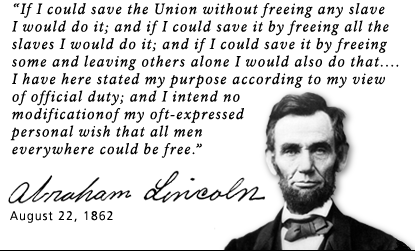
Mr. Romney’s responsibility at this point is to make his candidacy equal to these stakes. Barack Obama is asking voters for a mandate to pursue the vision and policies he outlines in speech after speech. As of now, if Mr. Obama wins, it will be because a confused electorate gave him their default, not their mandate. That would be a poor and undeserved end to this election. Right now, the content and course of the Romney campaign does not feel equal to an historic mandate election.
Mr. Romney deserves the chance he has now. He has earned it for himself. Sometime soon, he should sit down in a quiet place and ask himself if in the weeks remaining, the American people deserve more from him.

If jet-skiing with his family on Lake Winnipesaukee rather than succoring the ten of thousands left without power in the wake of the July thunderstorms throughout the critical swing states of Ohio and Virginia is any indication, Romney’s incapable of recognizing he’s even got a problem.
As Peggy Noonan notes in her latest column:
“….There was a perhaps pessimistic assumption that no one in Boston would be open to advice. A veteran of a previous Romney campaign who supports the governor and admires him—”This is a good man”—said the candidate’s problem isn’t overconfidence, it’s a tin ear. That’s hard to change, the veteran said, because tin-earness keeps you from detecting and remedying tin-earness.“
Can it be mere coincidence….

….”dressage” and “disaster” both begin with the letter “d”….along with “deaf” and “dumb”?!?
That being said, as this next item, courtesy of John Podhoretz writing at CommentaryMagazine.com details, we’re still of the opinion the GOP’s future is looking bright….or at least far brighter than the MSM’s polls would have you believe:
Are Democratic Voters Surging?

The blizzard of polls that emerged yesterday afternoon had morphed into an Obama avalanche by the time dinnertime rolled around. Surveys at the national and state level disagreed with the results of the two daily tracking polls, Gallup and Rasmussen, which show a tied race around 47 percent. Every other survey, with the exception of one in New Hampshire, showed Barack Obama ahead, and in most cases ahead outside the margin of error. That includes polls of the swing states Mitt Romney has to win if he is to prevail in November.
I said yesterday afternoon that the polls suggested Obama was ahead, but by a little, not a lot. How does that conclusion stand after the data onslaught?
Look, when every poll but two points in the same direction, it would be madness to say signs point to the opposite. Clearly, Obama is leading, and maybe by more than a little. More damaging for Romney’s prospects is the fact that the lead is either stable or strengthening in those battleground states.
Or is it?
The only reason to think it isn’t strengthening goes to one common feature these Obama-friendly polls share—a surge in the number of Democrats ready or likely to vote over the past month. Take Wisconsin, where two polls gave Obama great comfort. The Quinnipiac survey showed Obama gaining 4 percentage points over its survey last month. But that gain was the direct result of the fact that the number of Democrats polled was also up by 4 percentage points. Even more telling was the Marquette University poll in Wisconsin, which showed Obama up a staggering 11 points since its last take—as a result of including 10 percent more Democrats in the survey.
Quinnipiac’s survey of Virginia featured a Democratic advantage of 11 points—a vast increase in the number of Democrats surveyed in previous tallies.
Some political observers would ask: What’s the issue? Democrats have outnumbered Republicans in every presidential year but one (2004) from time immemorial. That advantage has typically been around 4 percent. But exit polls in 2008 showed a Democratic advantage of a staggering 8 points. So why aren’t these 2012 poll results simply to be accepted?
Simple. We have solid, data-driven reasons to think 2008 was an unprecedented moment that will not be replicated this year.(See Wayne Root’s analysis at http://townhall.com/columnists/wayneallynroot/2012/05/30/why_obama_will_lose_in_a_landslide/page/full/) Put Bush fatigue, the Wall Street meltdown, the Obama novelty phenomenon, and a terrible GOP candidate in a blender and you get the 2008 Obama froth.
What would cause such a surge this year? Two thirds of the country says we’re on the wrong track.

That’s a wipeout-for-Obama number, not a number suggesting that Obama will match or better his result in 2008. And bettering his result is what many of these surveys anticipate. In ’08, Democratic voters outnumbered Republicans by 6 percent—not 11, as the Marquette poll would have it in its present survey. Or 9, as Pew would have it.
But why would his result even remain close to the same? Just two years ago, there was a GOP surge leading to a 63 seat gain in the House of Representatives. Nationwide, the vote percentages from 2008 flipped. In ’08. Obama won 53-46; the GOP nationally won 53 percent of the vote in ’10. The 8-point Democratic advantage of ’08 declined into an even split—from 39D-32R to 35-35.
How could Obama get back to 2008 levels only two years later when conditions are not much improved, if at all, for him or the country?
The obvious riposte is that the presidential-year electorate is much larger and more varied than a midterm electorate. In 2010, 90 million people voted. In 2012, we can expect somewhere between 130-140 million. That’s a big difference, but it’s not a colossal difference.
Let’s assume every one of those 90 million people votes this year—a proper assumption, as midterm voters are extremely engaged politically. That would constitute something like 60 percent of the 2012 electorate. Imagine that they all were to vote the same partisan way in 2012. This would be like saying it’s election night and Bret Baier is already intoning, “With 60 percent of the vote counted, Mitt Romney leads Barack Obama by seven points.”
If that were to happen, it would be time to call the election for Romney. Almost certainly, it won’t. All the evidence suggests a measurable number of people who voted GOP in 2010 will vote for Obama in 2012. None of them, pretty much, will be Republicans, more than nine of ten of whom will vote for Romney. Nine of ten Democrats will vote for Obama.
So everyone who switches will be an independent. Independent voters swung harder and faster in 2010 than at any time in the nation’s history—from supporting Obama by 18 percent to supporting Republican candidates by 8 percent, a shift of an astonishing 25 percent. Obviously, people that fickle will bounce around some. But are they really going to swing back in numbers sufficient to hand Obama the kind of victory the polls are presaging? For what reason?
And talk about independents in this way doesn’t explain why it would be that Democrats would suddenly awaken from a three-year slumber and begin to feel like it was 2008 all over again. It could be happening. But shouldn’t something other than a good speech by Bill Clinton be responsible for such a thing? Romney’s inability to score any higher than 47 percent in any poll is certainly a sign he’s not making the sale—but whatever his weaknesses, it seems unlikely he’s the cause of a mad rush to ensure he doesn’t get the White House.

These are the reasons to be reasonably skeptical—not dismissive, not conspiratorial about motive, but reasonably skeptical—about the margins by which these polls are bolstering and boosting Obama. They appear to anticipate an electorate on November 6 that is more Democratic and Obama-friendly than is likely to be the case.
The Romney people should not be skeptical, though. They ought to believe it. They ought to think they’re behind, because they are; and they ought to think they’re farther behind than they are, because that is the only way they will experience the urgency they need to show to change the trajectory of this race.
Perhaps they, like their excessively calm candidate, haven’t quite reckoned with the degree of public humiliation and outright scorn that will be hurled in their faces and the damage that will be done to their professional reputations if Romney loses a race he should have won.
They, like Romney, have every reason to fear such a result and to act dramatically to prevent it. And they have an obligation to the 60-million-plus people who will vote for them, and who believe the country’s future is at stake, not to let this all dribble away.
Moving from dribble to drivel, we check in with the man The Obamao would replace as driver of the Progressive vehicle for global utopia:
UN Chief: Anti-Islam Filmmaker ‘Abused’ Freedom of Expression

UN Secretary-General Ban Ki-moon said on Wednesday the maker of an anti-Islam film that triggered violent protests across the Muslim world abused his right to freedom of expression by making the movie, which he called a “disgraceful and shameful act.” The film, posted on the Internet under several titles including “Innocence of Muslims,” mocked the Prophet Mohammad and portrayed him as a womanizer and a fool.
It sparked days of deadly anti-American violence in many Muslim countries, including an assault on the US consulate in Benghazi in Libya in which the US ambassador died.
“Freedoms of expression should be and must be guaranteed and protected, when they are used for common justice, common purpose,” Ban told a news conference. “When some people use this freedom of expression to provoke or humiliate some others’ values and beliefs, then this cannot be protected in such a way.”
You know….like in all the countries with whose leaders Moon and The Dear Misleader chum around:






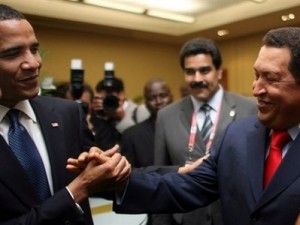
It sends a tingle up our leg just knowing the survival of the Constitution untold numbers of Americans have died defending is now in the hands of….

And on the domestic front, the WSJ reports another grid on which Mitt should have maintained fire:
Welfare Reform as We Knew It
Inside the Obama work waiver: It’s worse than Romney says.

It’s hard to remember now, but this summer Mitt Romney opened a useful debate about “dependency”—concerning President Obama’s regulation to rewrite the 1996 welfare reform. Democrats deny any such intent, but as early as this week the House plans to hold a vote to override the new rule.
So it’s a good moment to dissect what the Administration is really trying to do, because in this case Mr. Romney is right: The Administration has made welfare’s work requirements far weaker, and for ideological reasons that the press corps has failed to report. (Say it ain’t so, Joe!)

The 1996 welfare landmark is among the few serious bipartisan reforms of government since the Great Society. (Which, in reality, has been an abysmal failure, having brought the nation to the brink of insolvency.) State innovators like Tommy Thompson’s Wisconsin gave Contract-with-America Republicans a model, while Bill Clinton promised to “end welfare as we know it.” Their insight was that both welfare recipients and the bureaucracies built around them needed better incentives to end dependency, such as time limits on cash benefits and asking the able-bodied to work or train to prepare for work.
Unreconstructed liberals—then about half of Democrats in Congress—predicted a return to Bleak House. Some Clinton officials resigned when he signed the bill. They were wrong in every way. Caseloads plunged by half, to 5.9 million in 2000 from 12.6 million in 1996. Health and Human Service Department studies show that most found work and saw their incomes rise. (The ONLY real success story since the War on Poverty was declared.)
The anti-reformers have nonetheless looked for an opening to resurrect the old system. They have now found a way via an HHS regulatory “information memorandum” in July that said the agency would waive workfare requirements if states asked.
HHS is selling this under the guise of “flexibility” and says the point is to get more people working, not fewer. But recall that the joint state-federal welfare program has always had “work” requirements. Prior to 1996, they included such demands as journaling, bed rest and massage therapy.
For this reason, the statute specifically enumerated a 12-point definition of “work.” People who can but don’t meet the work terms eventually lose benefits. States have enormous flexibility to help recipients back into the job market. But they forfeit a portion of their federal money unless a certain percentage of their caseload complies—generally between 30% and 40%.
HHS has unilaterally upended these incentives. (Which begs the question, why no lawsuit to enforce the law Congress legally enacted?!?) States can now get a waiver if they want “to test approaches and methods other than those set forth in section 407,” the work requirement provision, including new “definitions of work activities and engagement.”
But states are already allowed to experiment now, as long as beneficiaries meet the work quotas defined by current law. The crucial change is that HHS is saying they can experiment instead of complying with the law.
HHS suggests, for example, that states adopt “a comprehensive universal engagement system in lieu of certain participation rate requirements.” Universal engagement means that everybody is doing something constructive with their time “for at least one hour per week,” even if that’s as simple as “researching child care options” or “a job readiness workshop,” as a 2008 HHS document put it. So everybody can spend an hour looking into day care instead of—”in lieu of“—the work that 30% to 40% are supposed to be doing.
This new standard didn’t appear out of thin air, but is part of a liberal critique of welfare reform that has made its way into the Administration. In 2005, Mark Greenberg of the Center for Law and Social Policy told Congress that welfare needs to be retargeted to families that are “not in work and not receiving welfare” and states ought to “work with, rather than drive away, families with serious employment barriers.”

In a 2006 article for the journal Policy & Practice, Mr. Greenberg worried that “the challenge is to ensure that compliance and penalty avoidance do not become the central goals of welfare reform.” He added that the work rate “was never a good measure of state efforts to help families get and keep jobs” and called for “more balanced approaches,” including “promoting sustainable employment” and “supporting labor market progress.”
Where’s Mr. Greenberg now? Well, he’s an HHS deputy assistant secretary for policy and the architect of the workfare waiver.
The problem with the waiver is also its illegality. (Along with so much else The Obamao enacts through executive orders.) Congress went to great lengths to ensure that work requirements aren’t subject to waivers to prevent backsliding. Yet with no more than a paragraph of legal analysis, HHS simply ruled it could suspend enforcement of laws that Mr. Obama does not like. This is unconstitutional, as the Washington lawyers David Rivkin and Lee Casey noted in these pages.
When its welfare rewrite became a political issue, HHS then invented a new standard that appears nowhere in its original memorandum and says that 20% more people need to move to work from welfare than before to get a waiver. The Heritage Foundation’s Robert Rector points out that this metric is bogus. The easiest way to achieve it statistically is to put 20% or more people on the rolls and then get credit when some naturally leave.
HHS’s last line of political defense is that the Republican Governors of Nevada and Utah asked for this change. They did, though they claim they weren’t trying to weaken the work requirements. In any case, in 2005, 29 GOP Governors including Mr. Romney asked for waivers on “allowable” work activities.
Yet the principle—those that can work must—isn’t partisan. The drafters of reform knew that Governors of either party might try to take the path of political least resistance. Many Republican Governors are as bad as Democrats on Medicaid spending, for instance. That’s why reformers created a structure that would resist gaming.
This is the reform that the Administration has, in fact, gutted. There’s flexibility to innovate and there’s “flexibility.” In the first case, HHS has denied Governors the running room to redesign Medicaid to be more cost effective. But now it tells states that they don’t have to comply with the most basic obligation of welfare reform. It’s as if HHS told states they can have the “flexibility” not to cover health care for poor people.
Americans support a safety net for those who fall on hard times, but they don’t want welfare to become a way of life. (Though Dimocrats most decidedly DO!) Mr. Obama seems to disagree, even if he denies it for the purposes of getting past Election Day. The House resolution to override the HHS waiver is an important reform moment, and if the Romney campaign were competent it would let every American know about it.
We refer you back to Item #3 above!
Next up, it’s today’s Muslim Minute, and the latest on the Religion of Pieces as Jonah Goldberg asks….
Can ‘Innocence of Muslims’ Trailer Really be that Potent?

Have we too, now insulted the Prophet (May the blessings of Allah be upon Him)?!?
The Obama administration’s omnibus answer to why the Middle East (and now much of the Muslim world) is in near open rebellion against the United States: The video did it. The follow-up question no one seems to be asking is: “What if the administration’s explanation is true?”
White House Press Secretary Jay Carney insists the attacks in Egypt, Libya and elsewhere were a “response not to United States policy, and not to, obviously, the administration, not to the American people,” but were rather a spontaneous “response to a video, a film we have judged to be reprehensible and disgusting.” On the Sunday shows, Susan Rice, U.S. ambassador to the United Nations, reaffirmed the claim that this was all about a YouTube trailer.
What about the fact that many experts say the Benghazi, Libya, attacks looked like a sophisticated, coordinated assault with rocket-propelled grenades? Meaningless. It was the video. Even the president of Libya said, “The idea that this criminal and cowardly act was a spontaneous protest that just spun out of control is completely unfounded and preposterous.” Who cares? It was the video.
Al-Qaeda is taking credit for the Benghazi assault as revenge for the June killing of al-Qaeda’s No. 2 man, Abu Yahya al-Libi. What’s your point? It was the video. Reports that the U.S was given a three-day advance warning by the Libyans of a possible attack? Video, video, video.
Now, I think this is absurd, like a Monty Python sketch gone awry — the parrot’s not dead, he’s just resting! But let’s assume it’s true and it really is all about the video. How on earth is that better?

According to the Obama administration, its policies in the Middle East are working. The Cairo speech, the tougher line with Israel, the withdrawals from Iraq and pending drawdown in Afghanistan, Obama’s coolness to Iran’s failed Green Revolution: These have all been part of the successful effort to repair the damage done by the previous administration. Yet all of that hard work can go up in smoke if some crackpot says something mean about the prophet Muhammad on YouTube?
Progress that flimsy strikes me as no progress at all.

It is simply a fact that Islamist radicals, the Arab street and the Muslim world have been angry at America for decades, under Republican and Democratic administrations alike. It’s also true that demagogues and other opportunists have used things like this video as an excuse to attack America and the West for generations. Obama isn’t solely to blame for the current conflagrations, though his naivete about the transformational power of his presidency deserves ample scorn.
And let’s not pretend that President George W. Bush wasn’t naive as well. His hope that love of democracy lurked just beneath the surface in the Middle East has proved at minimum more complicated, bloody and expensive in practice than in theory. But at least you could tell what Bush was for in the Middle East: freedom.
With Obama it’s not so easy. Apparently you can’t say Obama apologized for America in his Cairo speech, but he certainly did make it clear we wouldn’t rub our values in anyone’s face anymore. During the Iranian Green Revolution, he acted as if the people’s yearning for freedom was really inconvenient. And, over the last week, this administration has talked about the First Amendment as if it’s something it’s stuck with.
“We do not stop individual citizens from expressing their views, no matter how distasteful they may be,” Secretary of State Hillary Clinton said in the diplomatic equivalent of a regretful sigh. Maybe that’s true (though the White House did ask YouTube to consider pulling the video), and federal authorities did drag the alleged filmmaker in for questioning.
But our public officials now treat attacks on Islam as especially offensive — more offensive than unremarked-upon near-daily attacks on Christianity, Judaism, Mormonism, atheism and just about every other faith and creed.
Why is Islam so special? The answer is, it’s not. But Muslim rioters get special treatment. And that’s nuts. If these people are going to hate us, even after President Obama has done such a fantastic job reaching out to the Muslim world, maybe we should just accept that fact and stand up for what we believe, without apology.
Though after viewing this next photo, courtesy of Balls Cotton, another, far quicker and more effective solution does recommend itself:

Since we’re on the subject of that which needs fixing, the WSJ asks what inquiring minds want to know:
Treasury Motors
If GM is ‘roaring back,’ why won’t Obama sell our shares?

Perhaps you’ve heard that General Motors is “alive” and that President Obama is more or less solely responsible. But if his $50 billion federal bailout is why “the American auto industry has come roaring back,” as he put it in Cincinnati Monday, why not formalize the achievement by unwinding the taxpayer stake in GM?
Er, because that would mean exposing the bailout’s ongoing damage. The Journal’s Jeff Bennett and Sharon Terlep reported Monday that the GM brass is importuning the Treasury to offload at least some of its 500 million shares, or 26.5% of the company. Their complaints include the Government Motors stigma and compensation ceilings that make it difficult to recruit talent—and though they don’t mention it, probably the political mediation over business decisions as well.
But the Administration is refusing GM’s stock buyback because it would mean losing billions of dollars on this “investment.” The auto maker’s shares are trading around $24, which is not merely a tumble from the November 2010 IPO price of $33 but means the government would lose $15 billion if it sold today.
GM’s share price needs to hit $53 for the U.S. to break even. Treasury may be waiting until after the election, when losses on any sale won’t affect electoral votes in Michigan or Ohio. Such a sale might be financially wise, because while GM may have come back from bankruptcy with the help of your tax dollars, its future profitability is far from guaranteed. The company’s government-financed bankruptcy failed to rationalize longstanding problems like union liabilities and especially fleet-mileage rules that will force Detroit to make cars it can’t sell profitably for years to come.
Speaking of government help for Detroit, on Monday the U.S. filed a World Trade Organization complaint accusing China of illegally subsidizing exports of automobiles and car parts to the tune of $1 billion between 2009 and 2011. “It is not right, it is against the rules, and we will not let it stand,” said the President, who owns a quarter of an auto maker. The trade action came a couple of days after Mitt Romney began running an ad saying Mr. Obama was soft on China trade.
Move along folks….nothing to see here.
Which brings us to this bit of National Socialist nostalgia, courtesy of Team Tick-Tock and Best of the Web:
The U.S. of O.
The Obama cult is back!
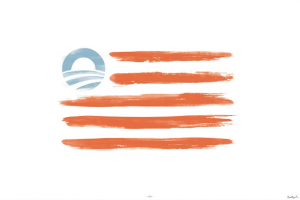
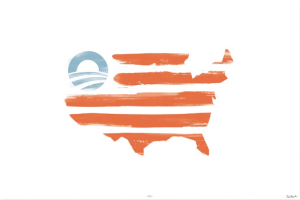
As James Taranto so eloquently observes, “It seems we have a president who thinks the national symbol is the bald ego.”
Why not just call a spade a spade and advocate replacing Old Glory with the Left’s true insignia:

On the Lighter Side….









Then there’s this beauty from Paul Croisetiere:

Finally, we’ll call it a week with what James Taranto terms….
Bush League Journalism
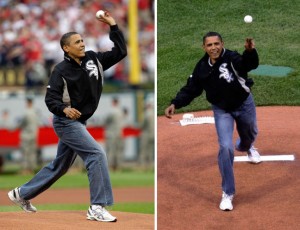
I put the “B” in Bush League!
The writer formerly known as Wonkette has a piece in London’s Guardian rehearsing the familiar argument that it’s racist to require photo ID to vote. But she does come up with one novel analogy:
Asking Americans if they support measures against voter fraud is like asking if they support measures against adults suiting up for Little League baseball. The problem is that there are probably more cheaters in baseball than voting: a recent analysis found cases of alleged voter fraud running about one for every 16,000 voters. What’s more, voter ID laws work in such a way that a no-adults-in-Little-League equivalent would ban not just grownups from playing, but also anyone who looked adult-ish and didn’t show up for practice with documentary evidence of minor status.
This is odd for a couple of reasons. Most obviously, it’s entirely incomprehensible to people in the United Kingdom. Baseball is an American invention, which has spread to Asia and Latin America. But the British have never heard of the sport, much less of Little League.
What’s more, if you check the official Little League rules, it turns out players are required to present at least three forms of identification to prove both age and residency. When will Eric Holder investigate this terrible injustice?
No time soon….

….assuming he’s still in office.
Magoo












































You must be logged in to post a comment.